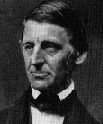
Transcendentalism
William Henry Channing(1810-1844)
"Transcendentalism, as viewed by its disciples, was a pilgrimage from the idolatrous world of creeds and rituals to the temple of the Living God in the soul."

Caricature of Emerson as a transparent eyeball by Christopher Pearce Cranch
Ralph Waldo Emerson, Nature (1836)
 "Standing on the bare ground,--my head bathed by the blithe air, and uplifted into infinite space,--all mean egotism vanishes. I become a transparent eye-ball. I am nothing. I see all. The currents of the Universal Being circulate through me; I am part or parcel of God" (996).
"Standing on the bare ground,--my head bathed by the blithe air, and uplifted into infinite space,--all mean egotism vanishes. I become a transparent eye-ball. I am nothing. I see all. The currents of the Universal Being circulate through me; I am part or parcel of God" (996).
Key Ideas in Transcendentalism
Other ideas important to transcendentalism
1. Nature as teacher, nurturer, discipline. The best part of humanity can be found through community with nature, a belief shared with Romantic poets such as Wordsworth.
2. Microcosm and macrocosm: each part of nature contains all within it.
3. Principle of analogy, of perceiving correspondences: "[M]an is an analogist, and studies relations in all objects."
4. Emblematic Nature: "Every natural fact is a symbol of some spiritual fact."
5. Universal soul ("Oversoul"): "Meantime within man is the soul of the whole; the wise silence; the universal beauty, to which every part and particle is equally related."
6. The principle of organicism; the concept of the circle.
7. Perfectionism and optimism: “Trust thyself: Every heart vibrates to that iron string